Description
Netherland Dwarf Rabbit
Netherland Dwarf Rabbit for Sale
Caring for Netherland Dwarf rabbits is similar to the care you’d provide for any rabbit. However, such a small breed is usually a bit more delicate, so it’s important to take special care of your Netherland Dwarf to keep him as healthy as possible.
Proper Housing for Your Netherland Dwarf Bunny
There are a lot of points to consider when setting up an appropriate habitat for a Netherlands Dwarf rabbit. Size and location are two prime concerns in dwarf rabbit care, but sticking to a cleaning schedule is also highly important.
Cage Size
Although Netherland Dwarf rabbits are one of the smallest breeds of rabbits, they still need plenty of room to live. Many pet experts recommend a minimum of 18×24 inches with 14 inches high, though many rabbit enthusiasts suggest a larger cage size of 4 x 2 x 2 feet (or more), which offers more room for exercise.
Type of Cage Bottom
You may choose a cage with a wire or solid bottom, just as long as you make sure there’s an area where the rabbit can be off the wire to rest his feet. The spacing on a wire bottom should be no more than 1/4 inch between bars. Outdoor hutches typically provide a completely enclosed area where the rabbit can enjoy the grass, as well as a raised house where the rabbit can go inside for more protection.
Keep the Cage Clean
If you choose a solid bottom cage, your Netherland should be litter box trained to keep his cage cleaner. You can use straw, hay or aspen shavings as bedding. Never use pine or cedar shavings since the aroma from these woods can prove fatal for rabbits. Remove droppings as often as necessary to keep the environment healthy, and give the cage a thorough scrubbing once a week.
Use an Appropriate Feeder and Waterer
The best feeder is one that attaches to the cage wall so the food won’t be tipped over into the bedding. Water bottles are preferable to open crocks because they prevent the water from becoming spilled or fouled with bedding or droppings.
Cage Location
The rabbit’s cage should be kept in an area of the house that isn’t susceptible to drafts. If your pet is going to be kept outside, which isn’t the best option for this small breed, he’ll need an enclosed hutch to protect him from the elements, as well as plenty of hay to nest in and stay warm.
Offer Shade From Direct Sun
Netherlands can also succumb to heat stroke very easily so also plan to locate the cage in an area where it will have shade from direct sun, and put a frozen two-liter bottle of water in the cage on hotter days to help cool the environment. Check and refresh your pet’s water bottle several times a day.
Foods for Your Netherland Dwarf Rabbit
According to the House Rabbit Society, a rabbit’s diet should consist of pellets, fresh hay, clean water, and fresh vegetables. However, that diet varies by age, so it’s crucial to feed age-appropriate foods in order to avoid stressing your pet’s digestive system.
Feeding a Netherland Dwarf Rabbit Baby Birth to Four Months
A Netherland kit nurses from his mother for his first three weeks of life. By 4 weeks old, he can begin nibbling small amounts of alfalfa pellets, as well as a bit of loose alfalfa. By about seven weeks of age, he will wean from his mother and be able to survive on pellets, loose alfalfa, and water until his digestive system has matured enough to begin introducing vegetables and greens.
Feeding at Four to Seven Months
At this age, you can begin introducing a small amount of vegetables into your pet’s diet, but it’s important to only introduce one type of vegetable at a time. Only offer about a teaspoon’s worth so you don’t upset his digestive system. A little Netherland’s digestive tract, like all rabbits, is quite delicate, and sudden changes can lead to diarrhea and, in the worst case scenario, death.
Organic Produce Is Safest
It’s best to use organically raised vegetables and greens, and you should wash these foods before serving them to your pet. According to the UALR, safe vegetables and greens include, but are not limited to:
Beet tops
Bell peppers
Broccoli
Carrots and carrot tops
Chinese pea pods (the flat kind)
Endive
Kale
Mint
Parsley
Radicchio
Keep in mind that vegetables are not meant to replace the Netherland’s staple diet of pellets and hay.
Feeding Rabbits Seven Months to One Year
At this age, a young Netherlands Dwarf is maturing into adulthood, and his diet will need other careful adjustments.
Switch From Alfalfa to Hay
Around seven months old, the loose alfalfa portion of the diet should be slowly replaced with hay. Oxbow Animal Health particularly recommends timothy hay/grass as a good source of roughage and nutrients, but oat hay and brome are also good choices and provide variety as well. Chewing hay gives rabbits an opportunity to grind down their teeth and keep them in good condition. Hay’s high fiber content also keeps hairballs from turning into bowel obstructions.
This is also the time to switch from alfalfa pellets to timothy pellets if they’re available in your area since alfalfa can be fattening for adults.
Keep Fruits to a Minimum
A few fruits may also be introduced at this age, but use them as treats and offer them sparingly. A teaspoon-size serving of apple or a thin slice of banana is more than enough. Follow the same plan for introducing fruit as recommended for vegetables, and watch to see if they upset your pet’s digestive system.
Netherland Dwarf Rabbit Full Grown Adult Diet
According to the Rabbit Producers Association, a Netherland Dwarf should receive approximately:
One-eighth cup per pound of body weight
Unlimited fresh timothy hay
Unlimited fresh water
Limited amounts of fresh vegetables
Match Amount of Food to Weight
Of course, each rabbit is unique, so you can increase or decrease the amount of pellets fed according to whether he feels too fat or too thin. This breed’s standard states adult bucks and does should top out around 2 1/2 pounds, so you can use that measurement as a guideline, but basically make sure his weight is a good match for his framework.
Veterinary Care for Netherland Dwarf Bunnies
Providing your Netherland with regular veterinary care can help you spot problems before they grow out of control. Just like cats and dogs, rabbits should receive annual checkups.
Vaccinations
According to Center Sinai Animal Hospital, pet rabbits do not require any vaccinations in the USA. However, there are a couple of serious diseases that rabbits need to be vaccinated against in other parts of the world, including Europe and the UK.
Viral haemorrhagic disease – This is a deadly form of calicivirus, and even though it is not as rampant in the USA as it is in some other countries, rabbits should be vaccinated against the virus because it is highly contagious. The initial vaccination should be given between 12 and 14 weeks old, with boosters given according to your veterinarian’s recommendation.
Myxomatosis – This is a viral disease that is transmitted via parasites like mosquitos, fleas, ticks, mites and lice. It can also be passed from one infected rabbit to another, and the infections is usually fatal. This disease is not very common in the United States, and there is no vaccine approved for use in this country as of 2014. However a vaccine against myxomatosis does exist and is used in the United Kingdom and elsewhere. The initial vaccination should be given at six-weeks-old, and repeated yearly or at your veterinarian’s recommendation.
Parasite Control
Rabbits are subject to fleas, mites and other parasites just like many other pets. Let your veterinarian help you choose a rabbit-safe preventative product to protect your Netherland from these pests.
Worming
Intestinal worms can rob your Netherland of nutrition, so it’s wise to carry out routing worming twice a year using a rabbit-safe worming product as recommended by your veterinarian.
Dental Care for Your Dwarf Bunny
Like all rabbits, Netherland Dwarf Rabbits not only like to chew, they need to chew because their teeth grow constantly. If they don’t chew frequently, their teeth can grow out of control. Your pet’s diet of pellets and hay should help keep his tooth growth in check, but he’ll also enjoy small chewable toys and branches from fruit trees.
There appears to be a higher occurrence of malocclusion in Netherland Dwarf Rabbits than other rabbit breeds. Malocclusion occurs when a young Dwarf has a growth spurt, but the jaw and mandible don’t grow at the same rate. The bottom incisors protrude away from the upper incisors, which means they won’t be able to work together when chewing to prevent them from growing out of control. It may be possible for the vet to trim the teeth in an effort to bring the problem under control.
Grooming Your Dwarf Rabbit
Netherland Dwarf Rabbits don’t need a lot of grooming since they keep themselves clean. However, when they’re going through a period of shedding, they might appreciate a little help removing excess fur. Use a soft brush or comb and brush in the natural direction of the rabbit’s fur. You can also take this opportunity to check for parasites.
The nails on a Netherland Dwarf will need to be trimmed regularly. You can do this yourself using a cat claw trimmer to trim just the nail tips, or your vet can perform the task for you.
A Little Care Goes a Long Way
Aside from the higher rate of malocclusion in Netherland Dwarf rabbits, they are fairly easy to care for. Spend time with your pet each day so you can become more familiar with him. This will help you spot troubles early when they are generally easier to treat. Providing a good diet, regular cage cleaning and some play time will keep your Netherland healthy and happy.
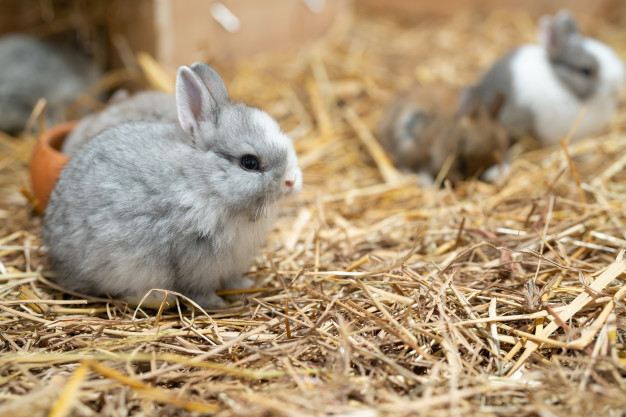
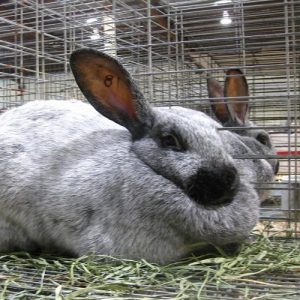
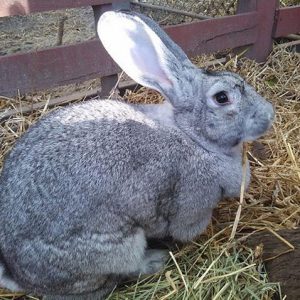
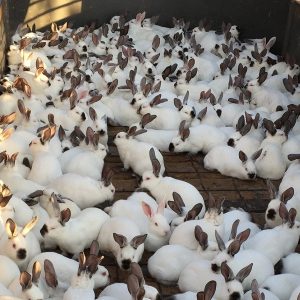
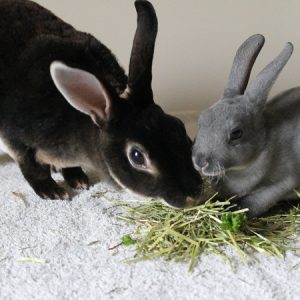
Reviews
There are no reviews yet.